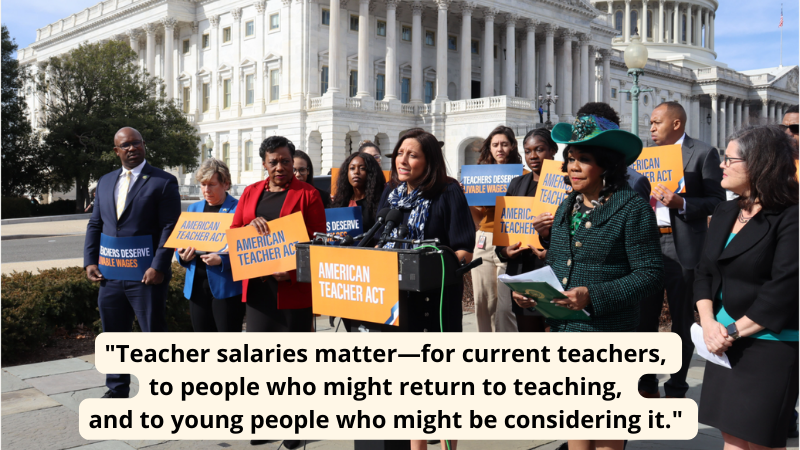Teaching used to be viewed as an esteemed, noble profession. It was a job that parents encouraged, happy to know their child could have a long and fulfilling career. Sure, it’s never been a very high-paying job, but there were other perks. It was a good way to make a living.
Times have changed.
Only 12% of teachers say they are satisfied with the profession.
Around 77% of U.S. adults feel teaching is among the most underappreciated professions.
More than 60% of parents say they don’t want their children to become teachers.
All of these statistics have one common source running through them: teacher pay. And there’s a major organization called The Teacher Salary Project that’s trying to do something about it. If the name sounds familiar, it’s probably because these are the same people who brought us the film American Teacher as well as the New York Times bestseller Teachers Have It Easy.
Dr. Ellen Sherratt is the board president of this organization, and she’s been studying and advocating raising teacher pay for years. She recently spoke with us about the importance of this topic and how others can get involved.
What does the research tell us about teacher pay?
The current teacher pay penalty has hit a historic high. This means teachers are paid 23.5% less than what other similarly educated professionals are paid. This number has been rising over the past 20 years, and it’s now at a historic high.
How could increasing teacher pay impact the teacher shortage we’re currently facing?
Right now, there’s new research that tracks teacher shortages. It shows that this year alone, there were more than 36,000 vacancies in the United States, which doesn’t even include the positions that were likely filled with less-than-qualified candidates. This impacts potentially millions of students.
There are some states and districts working to increase pay. How does that impact what you are doing?
We’re trying to create a groundswell of support to bring positive changes to the teaching profession. We see these pockets where leaders are doing the right thing, and they’re showing that it’s possible to raise teacher pay. But we still need more from local and state legislators.
What legislation are you all working on to support teacher pay?
We have the American Teacher Act, introduced earlier this year by two teachers in Congress: Representative Frederica Wilson in Florida and Representative Jamaal Bowman in New York. It advocates paying all teachers a minimum of $60,000/year. We have many co-sponsors in the house (currently 64), and as of last week, the bill became bipartisan. The next step in the process for this would be a committee hearing.
Are there other efforts around this as well?
There are. Bernie Sanders introduced the Pay Teachers Act. Then there’s also the Retaining Educators Takes Added Investment Now (RETAIN) Act, and Respect, Advancement, and Increasing Support for Educators (RAISE) Act. We hope all of these efforts can join together in a committee hearing so we can talk about all the different approaches and efforts. After that, the next step would be to collaborate and push for a bill that can be taken for a vote on the House floor.
How can educators get involved?
We have a lot of need for grassroots advocates who help reach out to legislators, write op-eds, and more. We’d love for others to reach out to us and join our weekly meetings to see how they can help.
Why is this cause important to you?
My husband was once a teacher, so I know what goes into this profession. But more than that, teaching is tied to every single issue that our country and planet face. When I was a little kid, I used to think about what our generation can do to leave the world a better place. I went on to study economics and specifically the economics of education, and there’s no doubt about it—teachers do that. Their impact and work leave the world a better place. Teacher salaries matter—they matter for current teachers, they matter to people who might return to teaching, and they matter to young people who might be considering it.
If you want to get involved in The Teacher Salary Project, visit the organization’s contact page.
Get more updates like this when you subscribe to our newsletters.
Also, be sure to check out this article about the benefits of increasing teacher pay.


